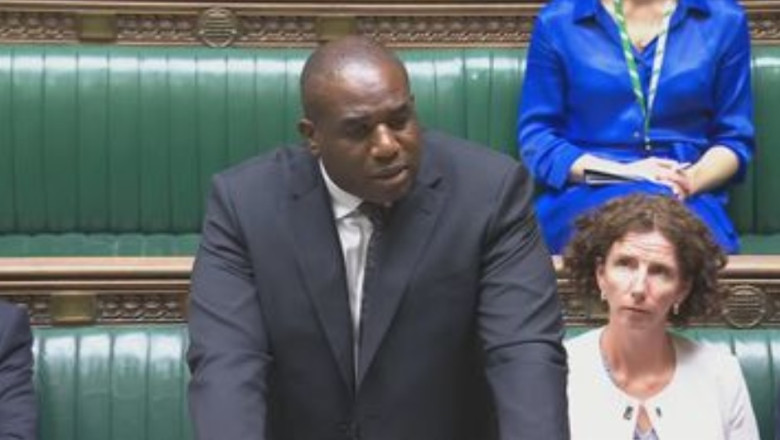
views
UK Suspends Arms Export Licences to Israel: A Complex Decision Amid Humanitarian Concerns
In a significant move reflecting rising humanitarian concerns, the UK government announced the suspension of 30 arms export licences to Israel on September 3, 2024. This decision comes in the wake of an escalating conflict in Gaza and reflects the government’s commitment to international humanitarian law (IHL). Foreign Secretary David Lammy emphasized that the suspension is a necessary step given the “clear risk” that these arms could be used to commit or facilitate serious violations of IHL.
The Context of the Decision
The decision to suspend arms exports is part of a broader review initiated by the government to assess Israel’s compliance with international humanitarian obligations. Lammy, on his first day in office, commissioned an exhaustive review, visiting Israel twice to gain insight into the situation on the ground. The findings raised significant concerns about Israel’s military operations in Gaza and their impact on civilian populations.
The UK’s robust export licensing criteria dictate that arms should not be exported if there is a risk of them being used in violations of IHL. This legal framework underscores the complexities that governments face when balancing national security interests with international humanitarian obligations.
Humanitarian Law and the Current Conflict
The ongoing conflict in Gaza has drawn widespread international attention, with countless calls for humanitarian access to civilians caught in the crossfire. The UK government has repeatedly urged Israel to ensure that essential food and medical supplies reach those in need, along with improved treatment for detainees. The suspension of the arms licences aligns with these humanitarian calls, signaling a shift in how the UK approaches its military exports during times of conflict.
Lammy articulated the legal duty of the government to review export licences, stating, “It is with regret that I informed the House... there exists a clear risk that they might be used to commit or facilitate a serious violation of International Humanitarian Law.” His remarks reflect the gravity of the situation and the ethical dilemmas faced by governments involved in arms trading.
The Specifics of the Suspension
The suspension affects approximately 30 export licences out of a total of 350 that the UK holds with Israel. The items in question include critical components utilized in military operations, such as parts for fighter aircraft, helicopters, and drones, as well as ground targeting systems that could be deployed in Gaza.
However, not all licences are suspended. Exports deemed unrelated to military operations in the current conflict, such as trainer aircraft and non-military items, remain unaffected. This nuanced approach illustrates the UK government’s effort to balance its obligations under international law while still maintaining aspects of its arms trade.
The Broader Implications
Secretary of State for Business and Trade Jonathan Reynolds highlighted the UK’s commitment to a robust export licence regime, stating, “We have a duty to uphold both our domestic and international legal obligations.” The suspension, while difficult, serves to reassure the public and international community that the UK is serious about preventing its arms from contributing to humanitarian disasters.
The decision also underscores the broader implications for international relations. The F-35 joint strike fighter program, a significant aspect of international military cooperation, remains a priority for the UK. Components for this program are excluded from the suspension unless they are sent directly to Israel, highlighting the delicate balance the UK must strike in its foreign policy.
Sanctions Against Threats to Stability
In conjunction with the suspension of arms licences, the UK government also announced sanctions against three individuals associated with the Islamic Revolutionary Guard Corps (IRGC) Quds Force. These sanctions target individuals deemed to threaten stability in the Middle East by sponsoring and supplying weapons to Iranian proxy groups, including Hezbollah. This dual approach of suspending arms exports while imposing sanctions aims to address the multifaceted nature of the conflict in the region.
The Human Impact
Behind the political and legal frameworks lie human stories—civilians in Gaza who face dire conditions as military operations escalate, and those in Israel grappling with the realities of conflict. The suspension of arms exports seeks to mitigate further suffering, but the situation remains complex. For many, the impact of these decisions is felt deeply, as they navigate life amidst violence and uncertainty.
Families in Gaza have been pleading for access to essential supplies, and the international community has echoed their calls. The UK’s decision is seen as a step toward acknowledging the humanitarian crisis unfolding in the region. Activists and humanitarian organizations have welcomed the suspension, viewing it as a necessary measure to prevent further violations of human rights.
A Path Forward
As the UK government navigates its responsibilities in the face of international law and humanitarian concerns, the situation in Gaza remains fluid and precarious. The suspension of arms exports to Israel is a pivotal moment that highlights the complexities of modern warfare and the ethical considerations governments must confront.
The UK’s stance reflects a growing recognition that military support cannot come at the expense of human rights. It also highlights the importance of continual dialogue and assessment regarding arms exports, particularly in conflict zones where the potential for humanitarian violations is high.
Conclusion
The UK’s suspension of arms export licences to Israel marks a significant development in the ongoing conversation surrounding military exports and humanitarian law. As the situation in Gaza evolves, the UK government’s actions signal a commitment to uphold international legal standards while navigating the intricate realities of global arms trade.
In the face of conflict, the hope remains that such decisions contribute to a more comprehensive approach to peace and stability in the region. The path forward will require ongoing dialogue, vigilance, and a steadfast commitment to ensuring that arms do not exacerbate suffering but rather contribute to a foundation for lasting peace.












Comments
0 comment